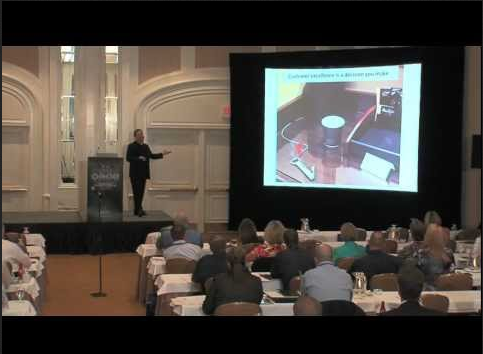My View From The Podium
As a professional keynote speaker, I know that the obvious part of my job is, well, obvious: I get up on a stage, freshly showered and dressed–me, not the stage–and kick off an event by speaking. For a brief amount of time, usually about an hour.
What happens onstage during that brief amount of time is what I’d like to look at today.
In one sense, this part is obvious too. Each keynote speaker’s content has an area of focus: keynote speakers specialize in everything from sales to global affairs to teambuilding to positive thinking. And, no doubt, someone out there specializes in negative thinking as well. (My own areas of focus — it’s so kind of you to ask — are customer service and company culture, hospitality, entrepreneurial leadership, and the changing expectations of incoming cohorts of customers, including millennials.)
Asking The Offstage Experts
But the more important meaning of “what happens during that time the keynote speaker is onstage,” — what the keynote speaker can do for your event and, perhaps, for your company trajectory, can be more opaque. How do keynote speakers add value to your company, your event, your conference, your corporate future–if in fact we do?
For this, while I can give you the view from the podium, I think we’d do best to check in with a couple of offstage experts:
Dr. Nick Morgan (arguably the best coach of professional speakers in the world) and Katrina Smith, peerless leader of the aptly-named Keynote Speakers Inc. (a speaking bureau with a storied roster, including the inimitable Guy Kawasaki).
Here are three questions I asked the two of them and their responses, along with my inevitable kibitzing.
Micah Solomon: What’s the point of a keynote speaker?
Nick Morgan: “The point of a keynote speaker is to change the minds of a group of people, to persuade them of something they hadn’t seen, known, or believed before.”
Katrina Smith: If a company, industry association, group of executives, or particular department “needs to understand the need for meaningful change, or see how that change has affected someone in a real life situation, or hear from someone else why that change was so valuable and essential,” a keynote speaker is the ideal vessel to relay that message. “We are social creatures, and while we can get information from books or websites, we get inspiration and social relevance and a sense of community from other humans.”
Micah Solomon: What can a keynote speaker really accomplish?
Nick Morgan “A keynote speaker is a temporary tribal leader who can move an audience to action. A keynote speaker has the opportunity to take an audience on an intellectual and emotional journey that can propel an audience to a new place, position, or outlook. People only take action because of other people, and a keynote speaker has a unique opportunity to do exactly that.”
Nick expands: A great keynote speaker will make the most of this situation by “asking for commitments from audiences, because speakers are uniquely positioned to get audiences to do something — thanks to the temporary authority they are granted by the occasion.”
Katrina Smith: A keynote speaker can compel through force of personality, with material that might not have worked in another context: “One keynote speaker can’t change the world. But one speaker, with the right message, the right tools, and the right delivery, can make an audience understand why their world needs to change, and then not only show them how to do it, but how to get inspired to do it well.”
Micah Solomon: What do you feel is not something that realistically a keynote speaker can make happen there onstage?
Nick Morgan: “A keynote speech is not an effective means of creating detailed next steps, plans, or high-depth strategic ideas. An audience is too busy responding to a keynote speaker’s message to work on such details. “
Katrina Smith: “It’s not realistic to expect that a speaker can come in for 45 minutes and fix a long-standing problem the company has been facing, a problem that perhaps the executives have been struggling for years to overcome. It’s not [going to work as] a quick fix. But it is a powerful delivery technique for new ideas, practical explanations, memorable examples, and inspiration about why the whole thing is important in the first place.
––––––––––––––
Extending the impact of the speech
Nick and Katrina speak above about the hope of making a lasting impact. One of the most straightforward and reliable ways to ensure the message is truly brought home after a keynote speech is to have books at the event for the audience to–literally–bring home as a complement to that speech. Here’s why. When a keynote speaker (myself for example) gets up there onstage it’s a tight, brief performance. I am, or so Nick Morgan tells us, “a temporary tribal leader.” And in this position it is only the broad strokes I can get across. I do this in the most memorable way possible, and am always gratified when the meeting planner has arranged to have books taken home afterword to serve both as a souvenir (literally: “memory”) and as an extrapolation: taking the broad strokes I can provide onstage and filling in the details.
Healing The Lame (Or At Least Just Not Hiring Them)
Finally, I can candidly say that I’ve heard a few lame keynote speeches and speakers in my time. (You, no doubt, have heard some as well.)
So, to wrap up I’d say that, to whatever extent a keynote speaker can make a difference for your event, and for your company, that speaker will make a lot more of a difference for you if she or he doesn’t suck.
Or, as Katrina Smith more diplomatically puts it, “Compelling material, delivered by a compelling individual, is so much more memorable and useful than the same material presented in a dry or rote way, by a canned or trite or disengaged speaker.”
========== ========== ========== ========== ==========
“Micah Solomon conveys an up-to-the minute and deeply practical take on customer service, business success, and the twin importance of people and technology.”–Steve Wozniak, Apple co-founder
Micah Solomon • Helping you enchant the customer of today.
Author-Speaker-Strategist-Consultant
Customer service – Company Culture – Loyalty – Leadership
“One of the very few keynote speakers who are enjoyable and informative at the same time.” – Eric Kline, The Payroll Group Conference
“Bring Micah to your organization to hear what he has to say. It will change your business. He has written the book on customer service, literally. ” – Jon Mueller, 800-CEO-READ
https://micahsolomon.com – Website, blog, and free chapter of Micah’s latest business bestseller, High-Tech, High-Touch Customer Service (American Management Association/AMACOM Books)




